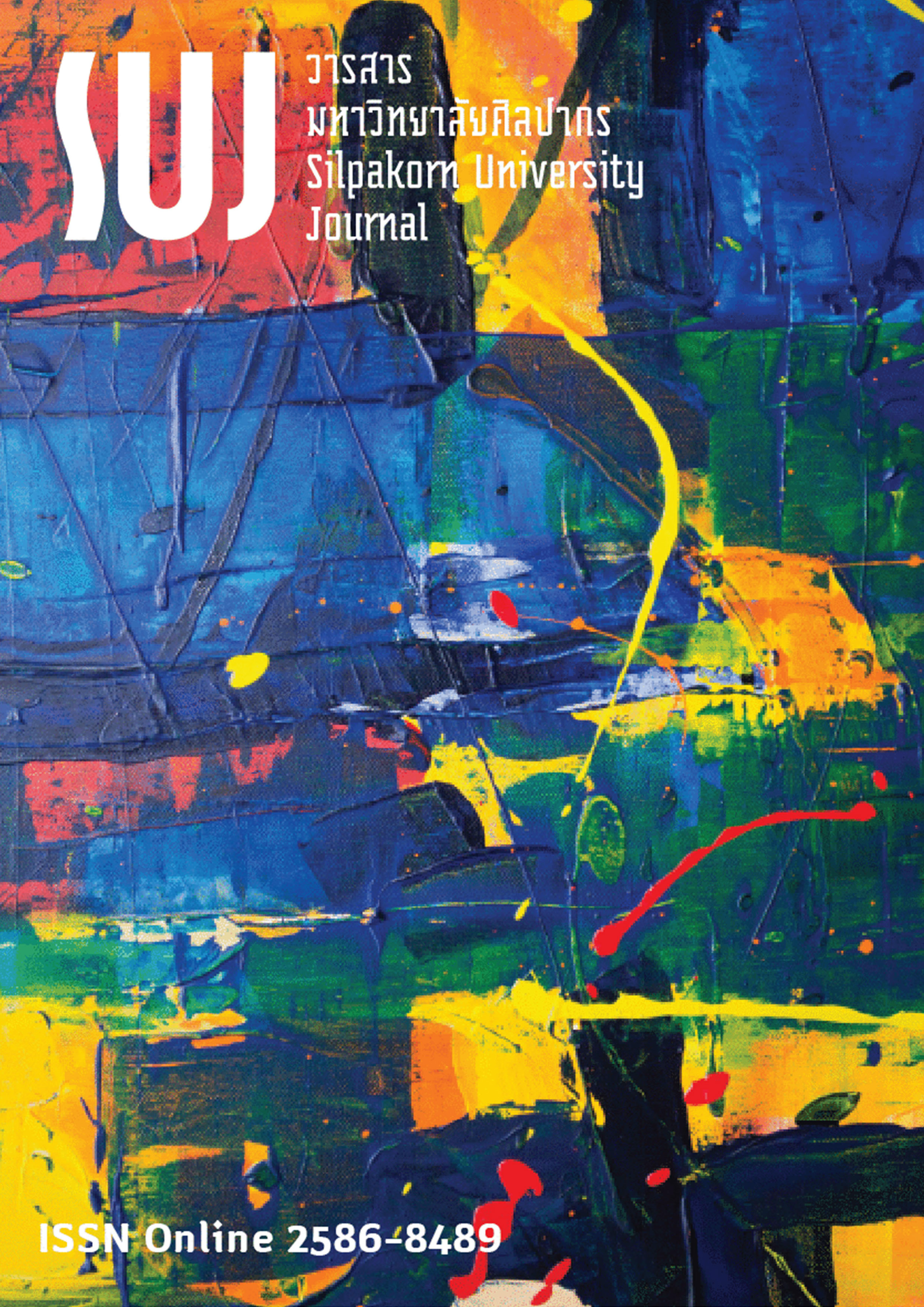การพัฒนาระบบตรวจสอบย้อนกลับผลิตภัณฑ์กาแฟพิเศษ กรณีศึกษา Coffee Go Green Café (The development of traceability system for specialty coffee: A case study of Coffee Go Green Café)
Main Article Content
Abstract
งานวิจัยนี้มีวัตถุประสงค์เพื่อพัฒนาต้นแบบระบบตรวจสอบย้อนกลับผลิตภัณฑ์กาแฟพิเศษ กรณีศึกษา Coffee Go Green Café มหาวิทยาลัยเทคโนโลยีราชมงคลล้านนา ลำปาง โดยใช้วิธีการวิจัยและพัฒนา แบ่งการศึกษาออกเป็น 2 ระยะ คือ ระยะที่ 1 การศึกษาความต้องการระบบจากกลุ่มผู้มีส่วนได้ส่วนเสีย แบ่งเป็น 2 กลุ่ม ได้แก่ 1. กลุ่มผู้ประกอบการร้านกาแฟ ผู้บริโภคกาแฟ เกษตรกรในพื้นที่จังหวัดลำปางและจังหวัดใกล้เคียง และ 2. กลุ่มนักวิชาการด้านเทคโนโลยีสารสนเทศด้านการตลาด และวิทยาศาสตร์การอาหาร โดยใช้แบบสอบถามแบบกึ่งโครงสร้างเป็นเครื่องมือวิจัย และใช้วิธีการเชิงคุณภาพในการวิเคราะห์และตีความหมาย ผลการศึกษาในระยะแรกนำมาสู่การศึกษาในระยะที่ 2 การพัฒนาระบบตรวจสอบย้อนกลับผลิตภัณฑ์กาแฟพิเศษ กรณีศึกษา Coffee Go Green Café ดำเนินการตามวงจรการพัฒนาระบบสารสนเทศ ซึ่งแสดงผลการวิเคราะห์และออกแบบระบบด้วยแผนภาพบริบท แผนภาพกระแสข้อมูล และใช้โปรแกรมภาษา PHP ในการเขียนโปรแกรม การจัดการฐานข้อมูลใช้โปรแกรม MySQL ผลการศึกษาพบว่า ระบบการตรวจสอบย้อนกลับผลิตภัณฑ์กาแฟพิเศษ แบ่งได้เป็น 5 ระบบย่อย คือ 1) ระบบการจัดการแหล่งผลิตกาแฟ 2) ระบบรวบรวมและการแปรรูปผลผลิตกาแฟ 3) ระบบการตรวจสอบคุณภาพกาแฟพิเศษ 4) ระบบการจำหน่ายกาแฟพิเศษ และ 5) ระบบการตรวจสอบข้อมูลและรายงาน ประเมินผลการพัฒนาระบบโดยผู้เชี่ยวชาญด้านเทคโนโลยีสารสนเทศ นักวิชาการด้านกาแฟ และตัวแทน Coffee Go Green Café พบว่า มีค่าเฉลี่ยความพึงพอใจต่อการใช้ระบบอยู่ในระดับดี โดยระบบสามารถช่วยตรวจสอบและติดตามข้อมูลผลิตภัณฑ์กาแฟพิเศษได้ครบทุกขั้นตอนของห่วงโซ่ผลิตภัณฑ์กาแฟพิเศษ
The aim of this research was to develop a traceability system for specialty coffee by studying the system of Coffee Go Green Café at Rajamangala University of Technology Lanna, Lampang. The research and development method has been divided into 2 phases. In phase 1, the project studied the demand for a traceability system from various stakeholders which are 1. coffee shop entrepreneurs, consumers, and farmers from Lampang and nearby provinces, Thailand, and 2. academics from the field of information technology, marketing, and food science. Semi-structured interviews and qualitative research were utilized as tools to collect and analyze the data. The results of the first phase led to the second phase that was the development of a traceability system for the Coffee Go Green Café, which used the system development life cycle process. The analysis and designs of the system were presented by using context diagrams and data flow diagram, and the PHP Language was used to code the programs. The traceability system for specialty coffee can be divided into 5 sub-systems: 1) coffee production management system, 2) collecting and processing system for coffee products, 3) special coffee quality control system, 4) special coffee distribution system, and 5) monitoring data and reports system. Experts in the field of information technology, marketing, food science, and a representative from Coffee Go Green Café were invited to evaluate the system. Satisfaction assessment forms were used to collect data. The results show that most of the participants are satisfied with the system. The system is able to confirm and trace information on the full production chain of specialty coffee.
Downloads
Article Details

This work is licensed under a Creative Commons Attribution-NonCommercial-NoDerivatives 4.0 International License.
References
Aung, M. M., & Chang, Y. S. (2014). Traceability in a Food Supply Chain: Safety and Quality Perspectives. Food Control, 39: 172-184.
Bressani, A. P. P., Martinez, S. J., Sarmento, A. B. I., Borém, F. M., & Schwan, R. F. (2020). Organic Acids Produced during Fermentation and Sensory Perception in Specialty Coffee Using Yeast Starter Culture. Food Research International, 128(1): 108773.
Brioschi Junior, D., Carvalho Guarçoni, R., de Cássia Soares da Silva, M., Gomes Reis Veloso, T., Catarina Megumi Kasuya, M., Catarina da Silva Oliveira, E., Maria Rodrigues da Luz, J., Rizzo Moreira, T., Grancieri Debona, D., & Louzada Pereira, L. (2021). Microbial Fermentation Affects Sensorial, Chemical, and Microbial Profile of Coffee under Carbonic Maceration. Food Chemistry, 342(1): 128296.
Centre for the Promotion of Imports from Developing Countries (CBI). (2019). European Market Potential for Specialty Coffee. [Online]. Retrieved October 10, 2020 from https://www.cbi.eu/node/1162/pdf
Delone, W. H., & McLean, E. R. (2003). The Delone and McLean Model of Information System Success: A Ten-Year Update. Journal of Management Information System, 19(4): 9-30.
Department of Business Development. (2019). Coffee Production Business (ธุรกิจผลิตกาแฟ). [Online]. Retrieved November 26, 2020 from https://www.dbd.go.th/download/document_file/Statisic/2562/T26/T26_201901.pdf
Khamsuri, Chirasak. (2019). Coffee Beverages in Thailand (เครื่องดื่มกาแฟในประเทศไทย). [Online]. Retrieved November 19, 2020 from http://fic.nfi.or.th/upload/market_overview/JUN2019Thailand_Coffee.pdf
Kresna, B. A., Seminar, K. B., & Marimin, M. (2017). Developing a Traceability System for Tuna Supply Chains. International Journal of Supply Chain Management, 6(3): 52-61.
Noitubtim, Madeena, & Sukkajornworg, Kanokwan. (2013). Application of Traceability System in Food Industry (การประยุกต์ใช้ระบบการตรวจสอบย้อนกลับในอุตสาหกรรมอาหาร). Princes of Naradhiwas University Journal, 5(4): 206-215.
Prechapanit, Oraya. (2014). System Analysis and Design (คู่มือเรียนการวิเคราะห์และออกแบบระบบ ฉบับสมบูรณ์). Nonthaburi: IDC Premier.
Purwandoko, P. B., Seminar, K. B., Sutrisno, S., & Sugiyanta, S. (2019). Development of a Smart Traceability System for the Rice Agroindustry Supply Chain in Indonesia. Information, 10(10): 288.
Rhinehart, R. (2009). What is Specialty Coffee?. [Online]. Retrieved October 9, 2020 from http://scaa.org/?page=RicArtp2
Sedtheetorn, Sunitha. (2019). Coffee shop business in Thailand (ธุรกิจร้านกาแฟในประเทศไทย). [Online]. Retrieved October 9, 2020 from http://fic.nfi.or.th/upload/market_overview/Rep_Cafe_15.01.62.pdf
Sukchareonpong, Sompon, & Thammasiri, Dech. (2018). The Development of Traceability System Using QR Code Technology and Retail Packing of Pomelos in Nakhon Pathom Province (การพัฒนาระบบตรวจสอบย้อนกลับโดยเทคโนโลยีรหัสคิวอาร์และบรรจุภัณฑ์การค้าปลีกสำหรับส้มโอในจังหวัดนครปฐม). Journal of Management Science Nakhon Pathom Rajabhat University, 5(1): 67-78.
Ta-Kham, Thitiwat, Chaiwongsar, Suraphon, & Chumjai, Jakkapong. (2021). The Development of Traceability System in Peanut Industry Supply Chain with Thai Agricultural Standard: TAS 4702-2014 (การพัฒนาระบบตรวจสอบย้อนกลับในห่วงโซ่อุตสาหกรรมถั่วลิสงตามมาตรฐานเกษตรไทย มกษ. 4702-2557). RMUTLI Journal Science and Technology, 14(1): 103-118.
Tantatsanawong, Panjai. (2011). Information Technology System Analysis and Design: A Managerial Perspective (การวิเคราะห์และออกแบบระบบเทคโนโลยีสารสนเทศในมุมมองด้านการบริหาร).Bangkok: Faculty of Sciences, Silpakorn University.


